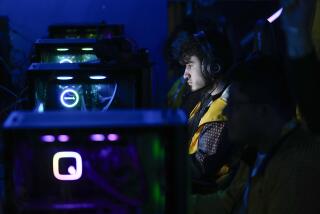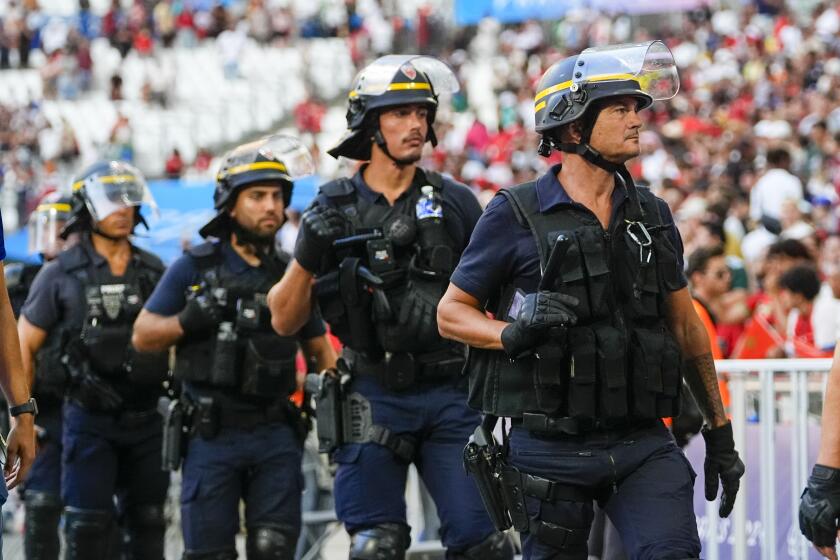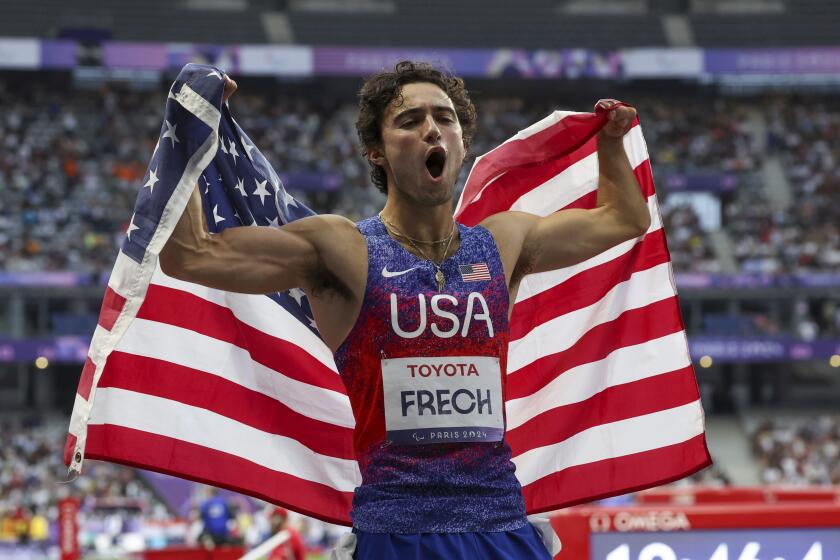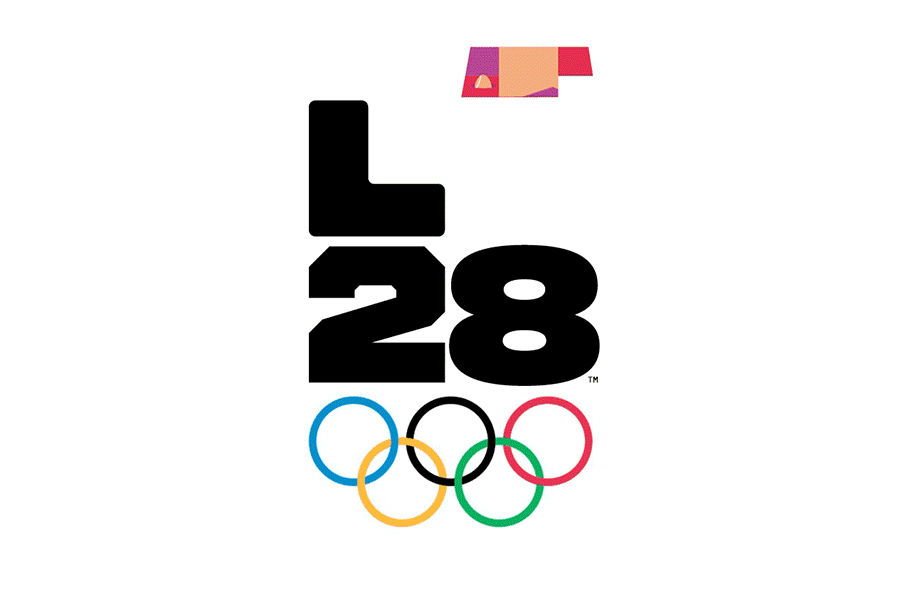Pressure on ice
Alexander Ovechkin hasn’t arrived yet, but his imprint is all over the Winter Olympics.
The Russian forward’s smiling face -- featuring a gap where one of his front teeth should be -- is on menus distributed aboard Sochi-bound flights on the Russian airline Aeroflot, on Coca-Cola machines in Olympic Park, and in advertisements for Coke. An official ambassador for the Games, Ovechkin was the first Russian to carry the Olympic torch after it was lighted in Greece and began its journey to Russia.
Whether the Washington Capitals winger and his teammates will win the last event -- the men’s gold-medal hockey game Feb. 23 -- will heavily influence whether Russia will consider these Games a success.
The Soviet Union’s Big Red Machine won seven of nine Olympic titles from 1956 through 1988, but that era is long gone. Russia hasn’t had its hands on Olympic gold since 1992, when a group of former Soviet republics played together under the Unified Team banner, and its last medal was a bronze in 2002.
There’s enormous pressure on the hockey team as a whole and Ovechkin in particular to win gold in the first Winter Olympics staged in Russia. The man who leads the NHL with 40 goals said he’s prepared.
“The Olympics are probably the most important thing for Russians than any other athletes in the whole world,” he told the Associated Press.
“And since I was a little kid and since everybody was a little kid, their dream was playing in Olympic Games, especially if we have a chance to represent our country in Sochi in Russia. It’s unbelievable and it’s going to be a great thing.”
In trying to duplicate Canada’s feat of winning at home in 2010, Russia can count on a formidable offense led by Ovechkin, two-time NHL scoring champion Evgeni Malkin of Pittsburgh and winger Ilya Kovalchuk, who left millions of dollars in New Jersey to return to Russia and play for SKA St. Petersburg of the Kontinental Hockey League. Team captain Pavel Datsyuk of the Detroit Red Wings normally would lead that list, but he sustained a lower-body injury on Jan. 1 and it’s not certain he will play.
The goaltending of Semyon Varlamov and 2013 Vezina Trophy winner Sergei Bobrovsky figure to be a plus for Russia, but its defense is less than imposing and could be its downfall.
Canada and the U.S. have better depth than Russia, but each must defy its Olympic history and adjust to a surface that’s 15 feet wider than NHL rinks.
Canada, which won in Vancouver four years ago on Sidney Crosby’s overtime goal, hasn’t won gold outside North America since 1952. The U.S., which brought back 13 players from the 2010 runner-up squad, has never won gold outside its own country: Its wins were at Squaw Valley in 1960 and Lake Placid in 1980.
Canada has impeccable depth up the middle with NHL scoring leader Crosby, Jonathan Toews, Ryan Getzlaf and Patrice Bergeron. Its defense balances puck-movers and bruisers. “We understand the opportunity is great,” Coach Mike Babcock said after the roster was announced, “and that means the preparation has to be equal. We won’t let you down in that area, I can assure you.”
Goaltending is a key asset for the U.S., with the Kings’ Jonathan Quick and Buffalo’s Ryan Miller vying for the starting job and Detroit’s Jimmy Howard supporting them.
“You look at strengths of the team, you have to look at the goaltending first and foremost,” said U.S. and Pittsburgh Penguins Coach Dan Bylsma. “Starting this whole process, we looked at five, six guys that could have been No. 1 guys on other teams.”
Team USA executives went young on defense by selecting the Ducks’ Cam Fowler, Washington’s John Carlson and Carolina’s Justin Faulk to play alongside veterans like Ryan Suter, Kevin Shattenkirk, Brooks Orpik and Paul Martin.
“I think our defense is a strength of our team,” Bylsma said. “I don’t think we look at our roster and say we’re the most skilled team in the tournament. I think our guys are the hardest guys to play against.
“We’re really not looking for this to be an All-Star competition. We’re looking to be the best team, and I like the composition of our team.”
Finland has won the most medals since the tournament was opened to NHL players -- two bronze and a silver -- and has a chance to add another. Ducks winger Teemu Selanne, 43, will make his hockey-record-tying sixth Olympic appearance and the Finns’ goaltending has the potential to be stellar in the hands of San Jose’s Antti Niemi and Boston’s Tuukka Rask. However, clever forward Mikko Koivu of the Minnesota Wild hasn’t been cleared to play since he underwent ankle surgery Jan. 6 and Finland would deeply miss him.
Sweden’s considerable skill level was diminished when Vancouver center Henrik Sedin had to scratch from the tournament because of a nagging rib injury.
Led by Chicago’s Marian Hossa and Boston’s Zdeno Chara, Slovakia, which lost to Canada in the 2010 semifinals, could be in the mix, although an injury probably will prevent defenseman Lubomir Visnovsky from playing. The team already lost winger Marian Gaborik to injury. Switzerland, which finished second at last year’s World Championships, might be ready to challenge the big hockey powers thanks to quality goalies -- the Ducks’ Jonas Hiller and Calgary’s Reto Berra -- and a promising defense that mixes NHL regulars with players who have stayed in Europe.
But all of this would become moot if Ovechkin and Russia can ride a wave of patriotism and pride and satisfy their compatriots’ high expectations.
“We just have to make people happy,” Ovechkin told the Washington Post this week, “and if you want to make people happy, you have to win the games and medals. Of course, everybody knows we going to have some problems with that pressure. But that’s good pressure. It’s going to be fine.”
--
Twitter: @helenenothelen
--
BEGIN TEXT OF INFOBOX
DUCKS PLAYING IN THE OLYMPICS
Teemu Selanne, FINLAND
Why picked: Legend at 43 ties Finland’s Raimo Helminen (1984-2002) for most Olympic appearances (six).
Olympic experience: All-time leading scorer in men’s hockey with 20 goals and 17 assists. Owns three career Olympic medals, bronze in 2002 and 2010, silver in 2006.
Jonas Hiller, SWITZERLAND
Why picked: Has 24 wins, including 14 straight at one point, for NHL’s top team, with 2.35 goals-against average and .915 save percentage.
Olympic experience: Debuted for Team Switzerland at the 2010 Games, going 2-2-1 with a 2.47 GAA and .918 save percentage. His 146 saves ranked third in tournament. Also played in 2007, 2008 World Championships.
Ryan Getzlaf, CANADA
Why picked: Ranks third in the NHL in points, has 27 goals while increasing his shooting this season, and leading team with 37 assists.
Olympic experience: Member of the Olympic-champion team in 2010, with three goals and four assists in seven games. Led Canada to gold medal in 2005 World Junior Championship, with nine assists.
Corey Perry, CANADA
Why picked: The lightning-fast forward and 2010-11 NHL MVP leads the Ducks in goals and has incredible chemistry with center Ryan Getzlaf.
Olympic experience:
Was on Canada’s gold-medal-winning 2010 Olympic team, scoring four goals with an assist and plus-five rating. Played with Canada in the 2012 IIHF World Championship.
Cam Fowler, UNITED STATES
Why picked: The smooth-skating 22-year-old defenseman groomed by Hall of Fame, four-time Stanley Cup champion Scott Niedermayer played himself onto the team with 24 assists while in the plus end in plus/minus.
Olympic experience: None, but played for the U.S. in the 2012 IIHF World Championship in Finland and Sweden.
Jakob Silfverberg, SWEDEN
Why picked: Hard-shooting 23-year-old forward with a nose for the net has been a constant in country’s international events.
Olympic experience: None.
Sami Vatanen, FINLAND
Why picked: Offense-minded 22-year-old
defenseman recalled to Ducks this week who has six goals and eight assists in 41 games.
Olympic experience: None.
----
KINGS PLAYING IN THE OLYMPICS
Dustin Brown, UNITED STATES
Why picked: Captain of 2012 Stanley Cup champions, a leader who will be team’s alternate captain.
Olympic experience: Alternate captain on the U.S. silver-medal team in 2010, no points in six games. Has played in four World Championships, as captain in 2009, had five goals in both 2006 and 2008.
Jonathan Quick, UNITED STATES
Why picked: Conn Smythe Trophy winner in 2012, affirmed talent with recent shutout win at high-scoring San Jose after missing time with groin injury.
Olympic experience: Member of 2010 Olympic team, but did not play for silver-medalist squad.
Jeff Carter, CANADA
Why picked: Team-best 20 goals, provides more scoring punch for defending champions and received endorsement of Kings Coach Darryl Sutter.
Olympic experience: None. Was a Team Canada member at 2006 World Championships (four goals in nine games).
Drew Doughty, CANADA
Why picked: Smart, intense defenseman with a powerful shot and ability to rack up minutes without reduction in effort.
Olympic experience: Played in seven games for 2010 champions, had two assists and was plus-six. Had six assists for silver-medalist 2009 World Championship team, won gold on 2008 World Junior team.
Anze Kopitar, SLOVENIA
Why picked: Rugged center, capable scorer and leader who has 46 points for the Kings.
Olympic experience: Slovenia, coached by Kopitar’s father, Matjaz, is playing in its first Olympics. Has played in three World Championships with country (three goals in 2008, 13 assists in 2007 Division I).
Slava Voynov, RUSSIA
Why picked: Defenseman, 24, signed a six-year, $25-million extension in the summer and has contributed 19 assists for team allowing second-fewest goals in NHL.
Olympic experience: None. Alternate captain for Team Russia at 2009 World Junior Championships.
-- Lance Pugmire
More to Read
Go beyond the scoreboard
Get the latest on L.A.'s teams in the daily Sports Report newsletter.
You may occasionally receive promotional content from the Los Angeles Times.









